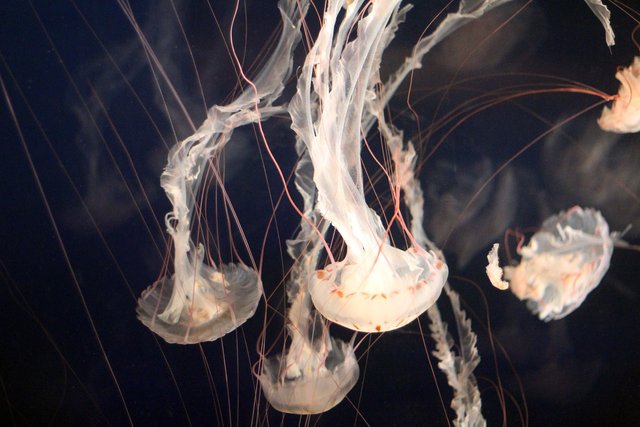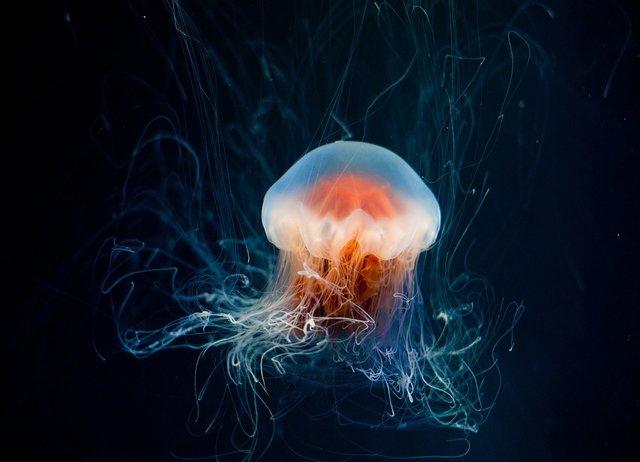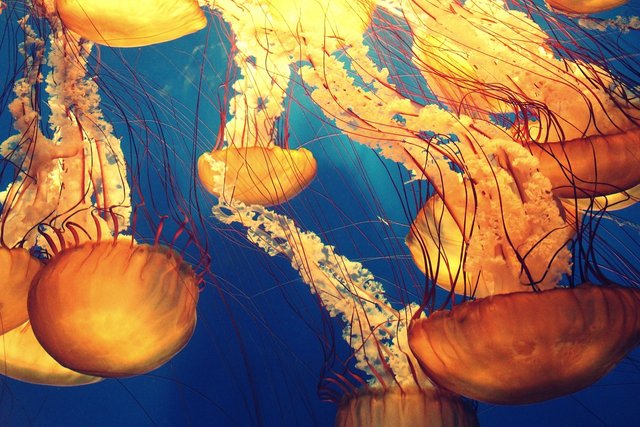
Jellyfish, also known as "jellyfish" in English, are very interesting and unique sea creatures. They belong to a group of animals called Cnidarians, which also includes sea anemones and other hydroids. Jellyfish have been on Earth for more than 500 million years, making them one of the oldest animals still in existence today.
One of the main characteristics of jellyfish is their transparent body and round or oval umbrella. This umbrella consists of a thin, elastic layer called mesoglea, which contains most of the water. Mesoglea gives jellyfish the ability to float and move freely in the water. Some species of jellyfish have long tentacles that extend around the edge of their umbrella. These tentacles function to capture food and as a means of defense.

Biologically, jellyfish do not have brains, spines, or complex circulatory systems. They have a simple nervous system called a sarcomere, which allows them to respond to stimuli such as light and touch. Jellyfish rely on their body movements and ocean currents to help them move from one place to another.
One of the interesting characteristics of jellyfish is their ability to reproduce sexually and asexually. They have a life cycle involving a polyp stage and a medusa stage. The polyp stage involves a rod-like body shape attached to the underwater surface, while the medusa stage is the more familiar "adult" stage, where they swim freely in the sea.
Although the beauty and uniqueness of jellyfish attracts the attention of many people, they can also be very dangerous creatures. Some species of jellyfish are equipped with tentacles containing poisonous stinging cells, called nematocysts. When a person is touched by these tentacles, they can experience skin irritation, pain, and even severe allergic reactions.

The existence of jellyfish is very important for marine ecosystems. They are part of the marine food chain, providing food for fish, sea turtles, and several species of seabirds. Additionally, as plankton predators, jellyfish help control plankton populations in certain waters, which in turn can affect the balance of the marine ecosystem as a whole.
Unfortunately, climate change and marine pollution have affected jellyfish populations in some areas. Global warming, for example, has caused an increase in jellyfish populations in some areas, while in others, their populations have declined due to factors such as overfishing or environmental changes.
Overall, jellyfish are amazing and important creatures in the marine ecosystem. They teach us about the uniqueness of marine life and the importance of maintaining natural balance. Further study of the biology and behavior of jellyfish is expected to provide deeper insight into their role in the global marine environment.
Downvoting a post can decrease pending rewards and make it less visible. Common reasons:
Submit
Upvoted. Thank You for sending some of your rewards to @null. It will make Steem stronger.
Downvoting a post can decrease pending rewards and make it less visible. Common reasons:
Submit
You've got a free upvote from witness fuli.
Peace & Love!
Downvoting a post can decrease pending rewards and make it less visible. Common reasons:
Submit
Thanks Dude
Downvoting a post can decrease pending rewards and make it less visible. Common reasons:
Submit